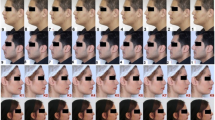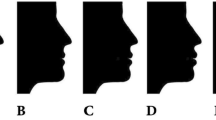Abstract
Current methods of assessing the quality of a surgically repaired cleft lip rely on humans scoring photographs. This is only practical for research purposes due to the resources necessary and is not used in routine audit. It has poor validity due to human subjectivity and thus low inter-rater reliability. An automatic method for aesthetic outcome assessment of cleft lip repair is required. The appearance and shape of the lips constitute the region of interest for analysis. The mouth borderline and corner points are detected using a bilateral semantic network for real-time segmentation. The bisector of the line linking the mouth corners is estimated as the vertical symmetric axis. By splitting the mouth blob into two parts, they are analyzed for similarity and a numeric score ranging from 1 to 5 is then generated. Pearson correlation coefficient between automatically generated scores and human-assigned ones serves as a validation metric. A correlation of about \(40\%\) indicates a good agreement between human and computer-based assessments. However, better automatic scoring correlation of \(95.9\%\) exists between the automatically detected mouth regions and those manually drawn by human experts, the third ground truth set in scenario two. Our method has the potential to automate an outcome estimation of the aesthetics of cleft lip repair with human bias reduced, easy implementation and computational efficiency.
Supported by Graduate Teaching Assistantship, Edge Hill University.
Access this chapter
Tax calculation will be finalised at checkout
Purchases are for personal use only
Similar content being viewed by others
References
Zhang, Q., et al.: A bibliometric analysis of cleft lip and palate-related publication trends from 2000 to 2017. Cleft Palate-Craniofacial J. 56, 658–669 (2019)
Shkoukani, M.A., Chen, M., Vong, A.: Cleft lip - a comprehensive review. Front. Pediatr. 1, 1–10 (2013)
Mosmuller, D.G.M., et al.: Scoring systems of cleft-related facial deformities: a review of literature. Cleft Palate-Craniofacial J. 50, 286–296 (2013)
Kar, M., Muluk, N.B., Bafaqeeh, S.A., Cingi, C.: È Possibile Definire Le Labbra Ideali? Acta Otorhinolaryngol. Ital. 38, 67–72 (2018)
Little, A.C., Jones, B.C., Debruine, L.M.: Facial attractiveness: evolutionary based research. Philos. Trans. R. Soc. B Biol. Sci. 366, 1638–1659 (2011)
Asher-McDade, C., Roberts, C., Shaw, W.C., Gallager, C.: Development of a method for rating nasolabial appearance in patients with clefts of the lip and palate. Cleft Palate Craniofac. J. 28(4), 385–390 (1991)
Piggot, R.W., Piggot, B.B.: Quantitative measurement of symmetry from photographs following surgery for unilateral cleft lip and palate. Cleft Palate Craniofac. J. 47(4), 363–367 (2010)
Pietrski, P., Majak, M., Antoszewski, B.: Clinically oriented software for facial symmetry, morphology, and aesthetic analysis. Aesthet. Surg. J. 38(1), NP19–NP22 (2017)
Deall, C.E., et al.: Facial aesthetic outcomes of cleft surgery: assessment of discrete lip and nose images compared with digital symmetry analysis. Plast. Reconstr. Surg. 138, 855–862 (2016)
Deng, Y., Loy, C.C., Tang, X.: Image aesthetic assessment: an experimental survey. IEEE Signal Process. Mag. 34, 80–106 (2017)
Berlin, N.F., et al.: Quantification of facial asymmetry by 2D analysis - a comparison of recent approaches. J. Cranio-Maxillofacial Surg. 42, 265–271 (2014)
Chen, S., Leung, H.: Chaotic spread spectrum watermarking for remote sensing images. J. Electron. Imaging 13(1), 220–230 (2004)
Kuruvilla, J., et al.: A review on image processing and image segmentation. In: Proceedings of 2016 International Conference on Data Mining and Advanced Computing, SAPIENCE 2016, pp. 198–203 (2016)
Yu, C., Wang, J., Peng, C., Gao, C., Yu, G., Sang, N.: BiSeNet: bilateral segmentation network for real-time semantic segmentation. In: Ferrari, V., Hebert, M., Sminchisescu, C., Weiss, Y. (eds.) ECCV 2018. LNCS, vol. 11217, pp. 334–349. Springer, Cham (2018). https://doi.org/10.1007/978-3-030-01261-8_20
Wang, Z., et al.: Image quality assessment: from error visibility to structural similarity. IEEE Trans. Image Process. 13, 600–612 (2004)
Acknowledgments
The facial images are the cropped and anonymised anteroposterior (A/P) photos of 5-year-old children from the Cleft Care UK (CCUK). This publication presents data derived from the Cleft Care UK Resource (an independent study funded by the National Institute for Health Research (NIHR) under its Programme Grants for Applied Research scheme RP-PG-0707-10034).
Author information
Authors and Affiliations
Corresponding authors
Editor information
Editors and Affiliations
Rights and permissions
Copyright information
© 2021 Springer Nature Switzerland AG
About this paper
Cite this paper
Bakaki, P., Richard, B., Pereira, E., Tagalakis, A., Ness, A., Liu, Y. (2021). Shape Analysis Approach Towards Assessment of Cleft Lip Repair Outcome. In: Tsapatsoulis, N., Panayides, A., Theocharides, T., Lanitis, A., Pattichis, C., Vento, M. (eds) Computer Analysis of Images and Patterns. CAIP 2021. Lecture Notes in Computer Science(), vol 13052. Springer, Cham. https://doi.org/10.1007/978-3-030-89128-2_16
Download citation
DOI: https://doi.org/10.1007/978-3-030-89128-2_16
Published:
Publisher Name: Springer, Cham
Print ISBN: 978-3-030-89127-5
Online ISBN: 978-3-030-89128-2
eBook Packages: Computer ScienceComputer Science (R0)




